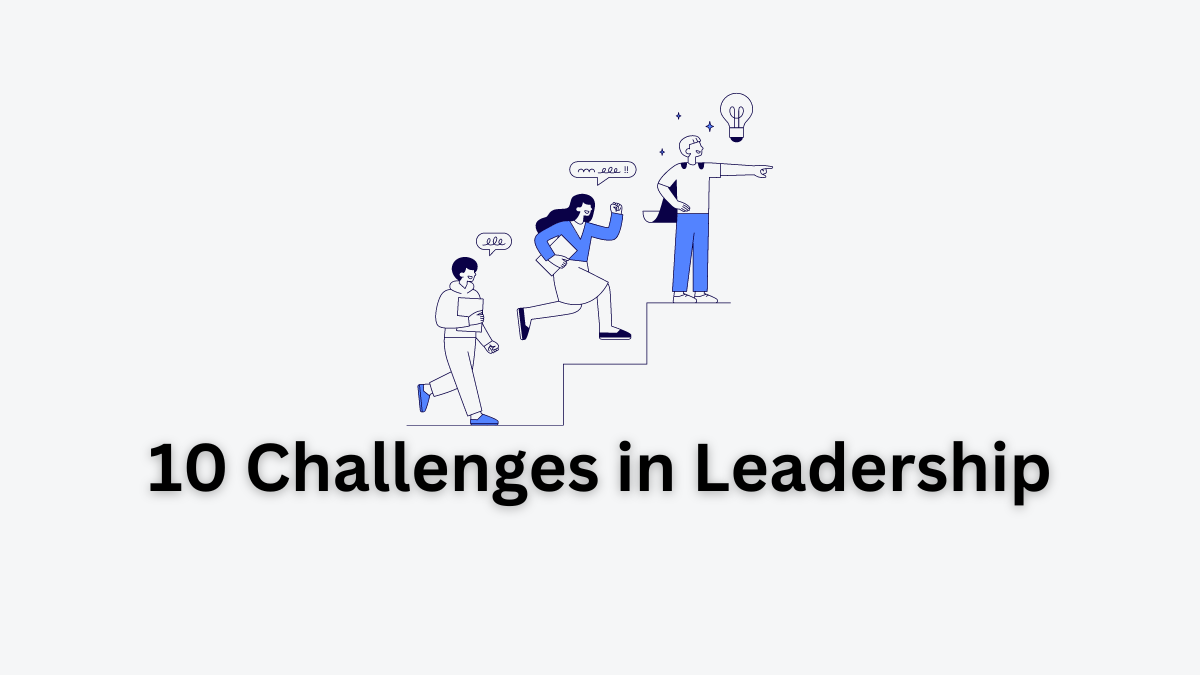Challenges in Leadership
Leadership is not merely about holding a position of authority; it’s about navigating through various challenges to inspire and guide others toward a common goal. In this article, we’ll explore the 10 key challenges in leadership and strategies to overcome them:
Staying Humble
Challenge: The temptation to become arrogant or egocentric when receiving awards or experiencing success can alienate team members and hinder collaboration.
Strategy: Cultivate humility by acknowledging the contributions of others, seeking feedback, and recognizing that leadership is about influence rather than authority. Regularly reflect on personal values and remain open to constructive criticism.
Overcoming Fear
Challenge: Fear of failure, uncertainty, or resistance to change can paralyze decision-making and impede progress.
Strategy: Acknowledge and address fears by reframing challenges as opportunities for growth. Foster a culture of psychological safety where team members feel comfortable expressing concerns and experimenting with innovative solutions.
Following Through
Challenge: Leaders may struggle to prioritize tasks and fulfill commitments, leading to incomplete projects and diminished trust.
Strategy: Develop effective time management and delegation skills to ensure tasks are completed efficiently. Break larger projects into manageable steps, set realistic deadlines, and hold yourself accountable for meeting objectives.
Keeping Yourself Motivated
Challenge: Sustaining motivation amidst setbacks or challenging circumstances can be difficult, impacting leadership effectiveness.
Strategy: Cultivate resilience by focusing on intrinsic motivations and long-term goals. Practice self-care techniques such as mindfulness, exercise, and seeking support from mentors or peers. Celebrate small victories and maintain a growth mindset to persevere through obstacles.
Read More: 10 Challenges in Departmentalization
Managing People and Resources
Challenge: Balancing the needs and dynamics of diverse team members while optimizing organizational resources can be complex and demanding.
Strategy: Develop strong interpersonal skills and emotional intelligence to navigate team dynamics effectively. Delegate tasks based on individual strengths and provide clear expectations and support for team members. Implement robust communication channels and feedback mechanisms to foster transparency and collaboration.
Guiding Change
Challenge: Leading organizational change requires navigating uncertainty, resistance, and competing priorities.
Strategy: Develop a comprehensive change management plan that includes clear communication, stakeholder engagement, and support mechanisms for employees. Foster a culture of adaptability and resilience by promoting continuous learning and embracing feedback.
Read More: 10 Challenges in Delegation of Authority
Dealing with Conflict
Challenge: Conflict within teams or between stakeholders can disrupt productivity and erode trust if not managed effectively.
Strategy: Address conflict proactively by promoting open communication, active listening, and empathy. Facilitate constructive dialogue to understand underlying concerns and collaboratively explore solutions. Implement conflict resolution techniques such as mediation or negotiation to reach mutually beneficial outcomes.
Delivering Bad News
Challenge: Communicating difficult messages, such as layoffs or project setbacks, requires empathy, clarity, and sensitivity.
Strategy: Prepare thoroughly for difficult conversations by anticipating potential reactions and crafting clear, empathetic messages. Choose an appropriate communication channel and provide opportunities for questions or clarification. Offer support and reassurance to affected individuals and demonstrate transparency in decision-making processes.
Read More: 10 Challenges in Decentralization of Authority
Develop Your Skills
Challenge: Prioritizing personal growth and development amidst competing demands can be challenging for leaders.
Strategy: Commit to lifelong learning by seeking out opportunities for skill enhancement, such as workshops, courses, or coaching sessions. Foster a growth mindset by embracing feedback and viewing setbacks as learning experiences. Delegate non-essential tasks to prioritize time for self-reflection and skill-building activities.
Keeping Everyone on the Same Page
Challenge: Maintaining alignment and clarity of purpose among team members can be challenging, especially in dynamic environments.
Strategy: Establish a shared vision and values that guide decision-making and behavior within the organization. Communicate goals, expectations, and progress regularly through team meetings, updates, and performance evaluations. Foster a culture of accountability and collaboration by encouraging open dialogue and recognizing individual contributions.
Conclusion – hence, these are the 10 challenges in leadership and strategies to overcome them.
Read More: 10 Challenges in Centralization of Authority
